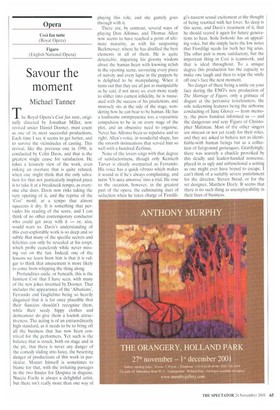Cosi fan tulle (Royal Opera) Figaro (English National Opera)
Savour the moment
Michael Tanner
The Royal Opera's Cosi fan tutte, originally directed by Jonathan Miller, now revived under Daniel Dooner, must count as one of its most successful productions, Each time I see it seems to get better, and to survive the vicissitudes of casting. This revival. like the previous one in 1998, is conducted by Colin Davis, and that is the greatest single cause for satisfaction. He takes a leisurely view of the work, even risking an overture that is quite relaxed, when one might think that the only salvation for that not particularly inspired piece is to take it at a breakneck tempo, as everyone else does. Davis now risks taking the very opening of it, and the reprise of the 'Cad' motif, at a tempo that almost squeezes it dry. it is something that pervades his reading of the score, and 1 can think of no other contemporary conductor who could get away with it — or, alas, would want to. Davis's understanding of this ever-explorable work is so deep and so subtle that many of the specific secrets and felicities can only be revealed at his tempi, which probe ceaselessly while never missing out on the fun. Indeed, one of the lessons we learn from him is that it is vulgar to think that amusement is more likely to come from whipping the thing along.
Profundities aside, or beneath, this is the funniest Cod that I have seen, with many of the new jokes invented by Dooner. That includes the appearance of the 'Albanians', Ferranclo and Guglielmo being so heavily disguised that it is for once plausible that their fiancées shouldn't recognise them, while their seedy hippy clothes and demeanour do give them a loutish attractiveness. The acting is of an extraordinarily high standard, as it needs to be to bring off all the business that has now been contrived for the performers. Yet such is the balance that is struck, both on stage and in the pit, that there is never any danger of the comedy sliding into farce, the besetting danger of productions of this work in particular. Mozart himself is sometimes to blame for that, with the irritating passages in the two finales for Despina in disguise. Nuccia Focile is always a delightful artist, but there isn't really more than one way of
playing this role, and she gamely goes through with it.
There are, by contrast, several ways of playing Don Alfonso, and Thomas Allen now seems to have reached a point of ultimate maturity, as with his surpassing Beckmesser, where he has distilled the best elements in all of them. He is quite detestable. imparting his gloomy wisdom about the human heart with knowing relish in the opening scene, savouring every piece of naivety and every lapse in the puppets he is delighted to be manipulating. When it turns out that they are all just as manipulable as he said, if not more so, even more ready to slither into earnest infidelity, he is nauseated with the success of his predictions, and morosely sits at the side of the stage, wondering how he can bear to be human. He has a loathsome omnipresence too, a voyeuristic compulsion to be in on every stage of the plot, and an obsessive need to organise. Never has Alfonso been so repulsive and so right. Allen's voice, in wonderful shape, has the smooth insinuations that served him so well with a hundred Zerlinas.
None of the lovers sings with that degree of satisfactoriness, though only Kenneth Tarver is clearly overparted as Ferrando. His voice has a quick vibrato which makes it sound as if he's always complaining, and turns -Un aura amorosa' into a trial. He rose to the occasion, however, in the greatest part of the opera, the culminating duet of seduction when he takes charge of Fiordili
gi's nascent sexual excitement at the thought of being reunited with her lover. So deep is this scene, and Davis's treatment of it, that he should record it again for future generations to hear. Soile Isokoski has an appealing voice, but she simply lacks the low notes that Fiordiligi needs for both her big arias. The other pair is more satisfactory, but the important thing in Cod is teamwork, and that is ideal throughout. To a unique degree this production has the capacity to make one laugh and then to wipe the smile off one's face the next moment.
No danger of there being a smile on your face during the ENO's new production of The Marriage of Figaro, only a grimace of disgust at the pervasive tastelessness, the sole redeeming features being the airborne conducting of Jane Glover — from memory, the press handout informed us — and the dangerous and sexy Figaro of Christopher Maltman. Most of the other singers are miscast or not yet ready for their roles, and they are asked to behave not as identifiable-with human beings but as a collection of fairground grotesques. Gratifyingly, there was scarcely a chuckle provoked by this deadly and leaden-handed nonsense, played in as ugly and unfunctional a setting as one might ever have hoped to escape. 1 can't think of a suitably severe punishment for the director, Steven Stead, or for the set designer, Matthew Deely. It seems that there is no such thing as unemployability in their lines of business.


















































































 Previous page
Previous page